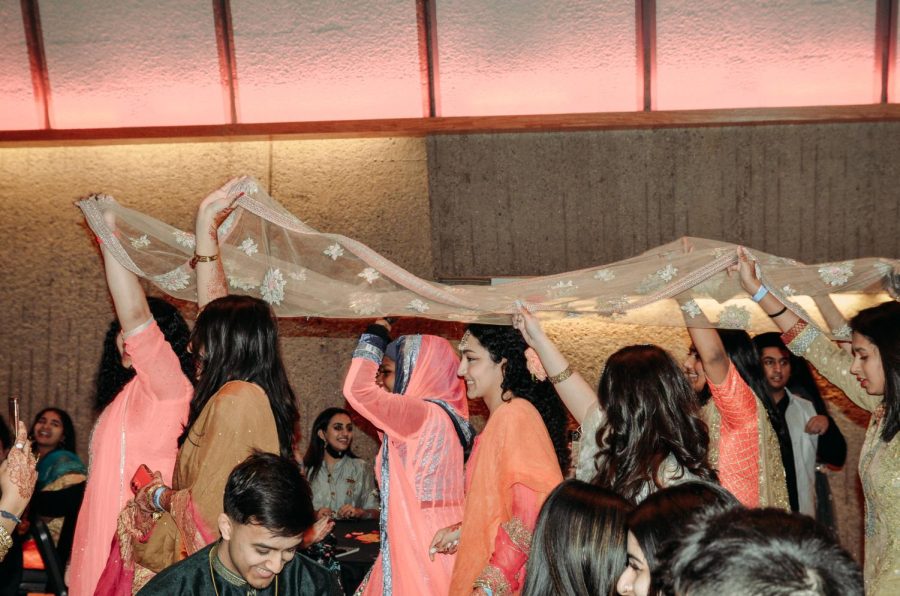Wearing vibrant dupattas and sherwanis, hundreds of students from the University of Massachusetts gathered in the Campus Center ballroom on Saturday, March 26 to celebrate mock Shaadi — a staged Pakistani wedding.
While many registered student organizations hosted a formal dance this winter, the Pakistani Student Organization (PSO) opted to simulate a Pakistani wedding, known as a Shaadi in Hindi.
“Weddings are huge in our culture,” senior and President of PSO Emaan Tariq said. “We felt like it was the best way to showcase our culture.”
First-year psychology major Maleeha Javed and Muhammad Abuzar, a finance major, served as the bride and the groom of the mock Shaadi, symbolically tying the knot in front of an excited crowd.
“I don’t know how I was able to keep it together,”Abuzar said, reflecting on the attention he and Javed received. “We were talking and I was like, ‘Bro, I’m so nervous. I don’t know what I’m supposed to do.’”
The night started when Abuzar entered the ballroom on the shoulders of other PSO members, drumbeats punctuating his arrival.
“The tradition is to just be crazy,” Abuzar said of his entrance. “You have to do something crazy and fun and full of excitement… Since I’m easy to carry, a friend of mine was like, ‘Okay, we’re just gonna carry you.’”
Shortly after the groom’s arrival, Javed entered the room under a sparkling dupatta, a traditional Desi scarf that the bridal party carries over the bride.
After leading their first dances of the night, Javed and Abuzar rose to the ballroom stage, sitting on an ornate sofa where attendees took pictures with the bride and groom. Javed wore a coral-colored salwar kameez and adorned herself in sparkling chooriyan—bangles, jhumkai—earrings, and a maang tikka—a jeweled hair ornament resting on her forehead.
“South Asians go all out for their weddings,” Javed said. “I’m not even fully decked out the way that they normally would be.
“A lot of the time, they get henna on their arms and their hands,” she said, pointing to the intricate designs on her fingers. “A lot of times, they’ll get it on their feet, too, I didn’t do that.”
Next to her, Abuzar wore a black sherwani, or formal coat, and a gold pagdi, which is the traditional groom’s headdress for Desi weddings.
“It’s super hard on your head, and it’s really uncomfortable, but it looks good,” Abuzar said while laughing.
After the bride and groom’s first dance performance, attendees enjoyed a traditional Pakistani dinner, including biryani — spicy rice, tikka masala — chicken, and gulab jamun — a moist ball of fried dough.
“It was cliche Brown food,” Abuzar said. “After dining hall food, that was so good.”
As the event came to a close, dancers from Mount Holyoke College’s Raunak Bhangra and UMass Dhadak Fusion Dance Team performed to medleys of Punjabi and American pop music.
First year Fawzi El-Kattan heard about Mock Shaadi from the Arab Cultural Association and appreciated how the PSO embraced cultural fusion.
“It’s a great way to bring in together my Arab side and my American side while also learning something new,” El-Kattan said. “The people here have experienced a lot of the same things that I have being an immigrant from the Middle East.
“A lot of people when they ask my name, they’re like, ‘Oh, where are you from?’” El-Kattan added. “I say Palestine, but here, people all are a bit different than the norm here on campus… I definitely feel like it’s a home away from home.”
Tariq welcomed students to attend future PSO events.
“I definitely recommend people to come,” Tariq said. “I feel like there’s this stigma around cultural orgs that you can’t join unless you’re part of that culture — so not the case.
“We want everyone to come, we want people to learn, we want to have other people see what our culture is like and enjoy it… We’d love to have you.”
Sophie Hauck can be reached at [email protected].



















